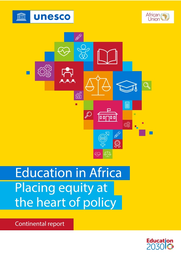Education in Africa: placing equity at the heart of policy. Continental report

Learning to read and write, and do simple maths, is a basic requirement in order to be able to function in this increasingly globalised and competitive world. And it is the duty of governments to provide children with these skills. It is with this in mind that the Pan-African High-level Conference on Education (PACE 2018) asked the African Union and the United Nations Educational, Scientific and Cultural Organization (UNESCO) to produce regular reports on the progress made towards achieving quality education for all.
This first edition, ‘Education in Africa – Placing equity at the heart of policy’, found that while many countries are taking important and significant positive steps towards reaching this goal, too many children are still left behind. It also found that the quality of schooling they receive varies widely. The report looks at six key topics: early childhood education, primary and secondary school, skills for work, teachers, education facilities, and means of implementation, and suggests that providing quality education for all children will require a complex set of interventions. It is hoped that the study will provide African governments with concrete guidelines and advice as they try to overcome the challenges they face.
More
Year:
Organisation:
UNESCO Office Dakar and Regional Bureau for Education in Africa, African Union
Keywords:
equity, inclusion in education, inclusive education policies, Africa
Marginalized & Vulnerable group:
All
Topic:
System wide approach
Level of Education:
Across the education sector
Type of Resources:
Guidelines and Tools, Research & Policy Papers
Country/Region:
Africa
Language of Publication:
English